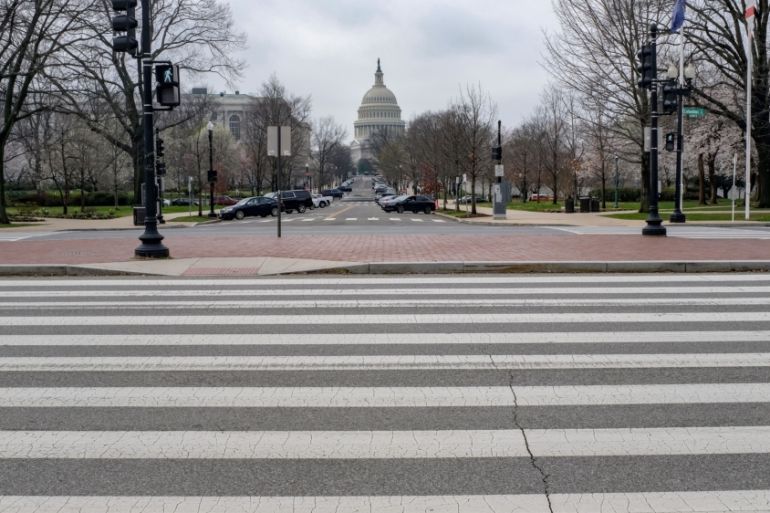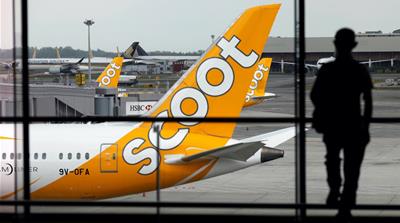Recession watch: Markets fall on economy woes despite US stimulus
Singapore’s economy shrank the most in a decade in the first three months of 2020, data show.

Kuala Lumpur, Malaysia – The approval of a $2 trillion coronavirus rescue bill in the United States Senate failed to provide much cheer for investors on Thursday, driving many of Asia’s largest stock markets lower.
Oil prices and European share markets also resumed their downward slide.
Keep reading
list of 3 itemsIndia’s outsourcing industry struggles to work from home
Singapore’s economy shrinks, virus-driven recession expected
The proposed measures by the US are unprecedented and will help cushion the world’s largest economy from a severe downturn caused by disruptions caused by measures to contain the spread of the virus, analysts said.
But the spending package is not expected to offer a significant lift to faltering demand for Asian exports as the world economy seems poised to contract sharply.
Many Asian economies are projecting a recession this year, defined as two consecutive quarters of negative growth.
“We think global financial markets are inching closer towards a stabilisation phase but the real economy could take more time to heal,” Freddy Lim, cofounder and chief investment officer of StashAway, a digital wealth management platform, told Al Jazeera.
“The honest truth is no one knows the path towards an eventual recovery but the final destination is clear.”
In Japan, the benchmark Nikkei 225 fell 4.51 percent, leading losses in Asia on Thursday. Local authorities in several Japanese cities and regions have urged their residents to stay indoors this weekend amid a spike in coronavirus cases, with a nationwide lockdown remaining a possibility.
The Nikkei, along with most other major share indices around the world, rebounded this week from multi-year lows reached on Friday as investors bought shares in anticipation of massive stimulus measures by governments, especially in the US.
Shares, oil under pressure
Tokyo also announced this week a postponement of the 2020 Summer Olympic Games, an event that was supposed to spur the Japanese economy.
South Korea’s KOSPI Index ended 1.09 percent lower on Thursday, while China’s Shanghai Composite dropped 0.60 percent. Hong Kong’s Hang Seng Index fell 0.74 percent, and Singapore’s Straits Times Index shed 0.96 percent.

Oil prices also fell, with Brent crude declining 1.75 percent to $25.91 a barrel. US West Texas Intermediate slumped 2.45 percent to $23.89 a barrel.
Energy prices have been roughly halved in recent weeks as a glut of supply from large producers like Saudi Arabia and Russia coincides with a slump in demand due to measures to halt transport and industrial activity to stop the coronavirus from spreading.
Bucking the region’s losses was Australia’s main stock gauge, S&P ASX 200 Index, which climbed 2.3 percent, and New Zealand’s 4 percent gain in the S&P NZX 50 Index.
Share markets in London, Paris and Frankfurt were down between 2.5 percent and 3 percent in early trading.
Help for US families, businesses
After days of intense negotiations, the US Senate approved a sweeping stimulus package late on Wednesday following a political agreement between policymakers from Democratic and Republican parties, and the White House.
The bill, set to be the largest rescue spending package ever approved by Congress, still needs to be passed by the US House of Representatives.
The targeted spending includes a $500bn fund to help industries hit hard by the escalating pandemic, such as airlines, and allocations for small businesses, state and local governments, cash handouts to Americans, federal unemployment benefits, as well as money for hospital and medical personnel to fight the outbreak.
Despite the enormous US fiscal stimulus measures, the effect of the pandemic and current lockdowns in the US is expected to lead to a severe negative shock to the US economy in the second quarter of this year, said Rajiv Biswas, chief economist for Asia Pacific at IHS Markit.
“With the Asia-Pacific region already being hit hard by the large number of travel bans and lockdowns across the region, the US stimulus is not expected to significantly mitigate the negative impact on the export sectors of Asian nations from recessionary conditions expected in 2020 in the US, Eurozone, UK and Japan,” Rajiv told Al Jazeera.
The expected global recession this year, coupled with the severe lockdowns across many Asian countries, is expected to reduce Asian economic growth and exports sharply this year, he said, adding that a gradual recovery is expected in late 2020 and during 2021 as the effect of the pandemic recedes.
More than 472,000 people worldwide have been sickened by COVID-19, which has killed more than 21,000 people, according to data by the Johns Hopkins University. More than 114,000 patients have since recovered.
Countries from China and India to Italy and the US have imposed drastic measures to halt the spread of coronavirus as cities are sealed, planes are grounded and most retail activities and factory productions are cut to the minimal.
Although some restrictions in China, where the virus originated, are being slowly lifted.
Canary in the coal mine?
Latest growth data released this week offer an early glimpse into the economic damage.
Singapore said on Thursday its economy shrank by 2.2 percent in the first quarter from a year earlier, its biggest contraction in a decade. Compared with the previous quarter, Singapore’s economy contracted by 10.6 percent in the first three months of 2020.

The grim numbers prompted the Southeast Asian nation to downgrade this year’s growth forecast to a contraction of between 4 percent and 1 percent to take into account disruptions caused by the pandemic. Singapore had previously projected for the economy to shrink as much as 0.5 percent.
In the US, investors will be bracing for initial weekly jobless claims data that are scheduled to be released later on Thursday. Analysts are expecting millions of Americans to have filed for unemployment insurance last week after massive layoffs were triggered by the pandemic, which forced businesses to shut as part of containment measures.
With more economic pain to come, financial markets may stay volatile for a while longer, analysts said.
“With the global COVID-19 pandemic still escalating, financial markets still face considerable turbulence in the months ahead until the pandemic starts to be contained globally,” IHS Markit’s Rajiv said.
“Asian equity markets remain vulnerable to further turbulence as investors continue to shift into safe-haven assets,” he added.
“With the world expected to be in recession and many Asia-Pacific economies in lockdown, financial markets are likely to face significant further turbulence until the pandemic shows signs of being contained worldwide.”